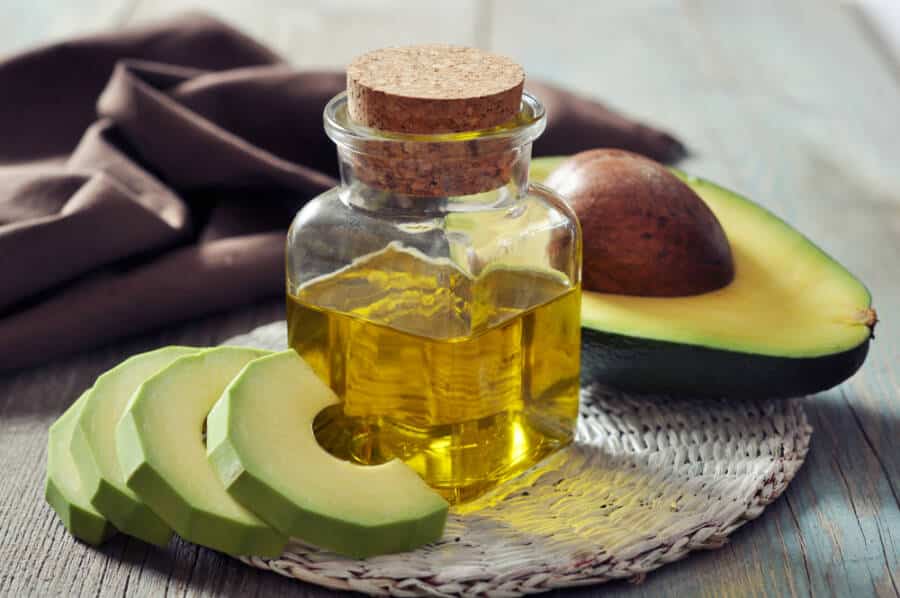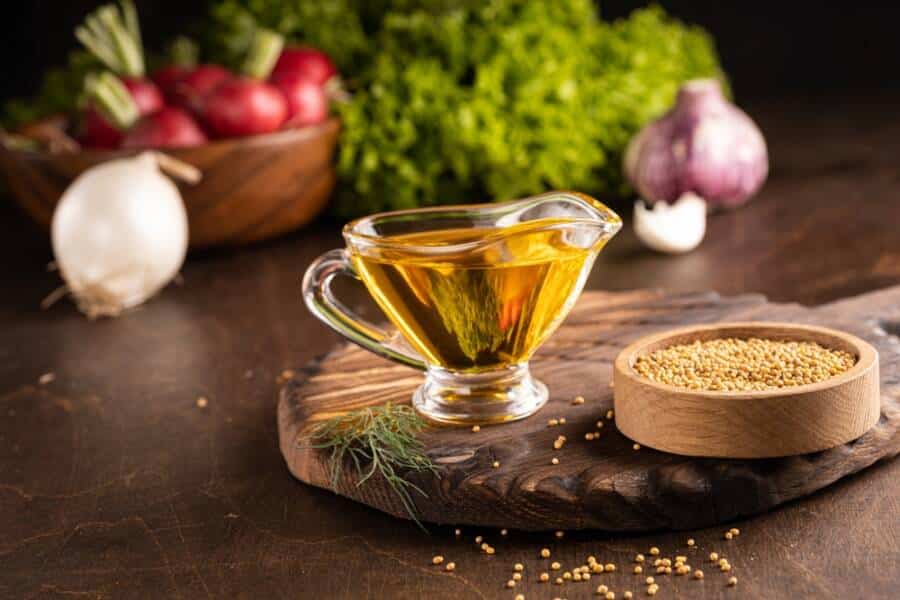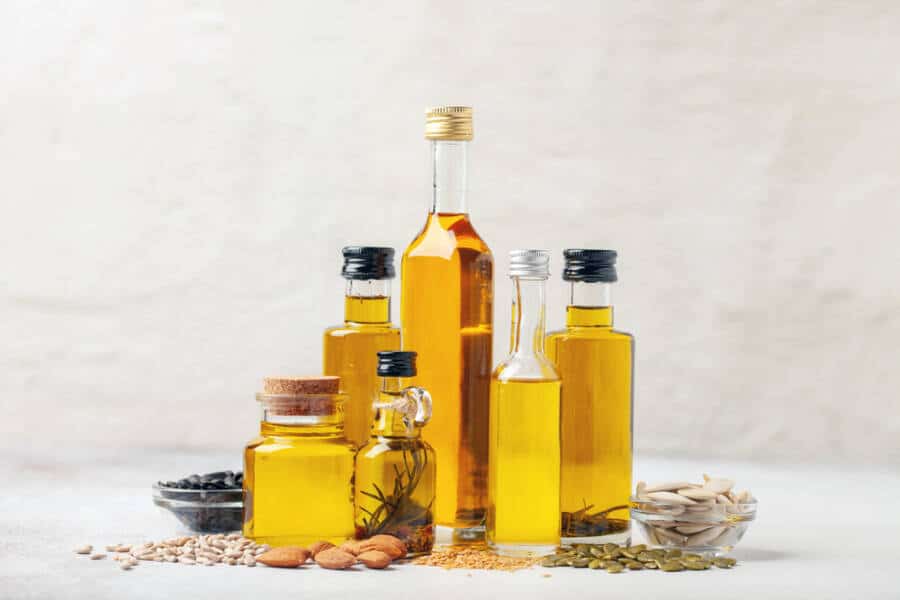Are you using the right cooking oil in your kitchen?
Most people use cooking oils regularly to prepare all sorts of dishes, including vegetables, sauces, meat, eggs, and certain grain dishes. And most folks try to focus on how to choose a healthy oil. But, the healthiness of an oil when it comes off the grocery shelf is only part of the story.
It’s also essential to consider whether the oil is still healthy to eat after you’ve heated it during the cooking process. This is because cooking oils have a wide range of smoke points or aren’t stable any more at certain temperatures. As a rule, you should try to avoid using cooking oils at temperatures above their smoke point.
But this can all get a bit confusing. So, to help you out, Indulging Health has come up with a list of 4 healthier cooking oils that tolerate high-heat cooking and which oils you should ALWAYS avoid heating.

Avocado Oil
Best for: Roasting, frying, baked goods
Avocado oil, which comes from the flesh of pressed avocados, has a high smoke point and mild flavor. So it’s perfect for almost any kind of cooking in the kitchen. This cooking oil has one of the highest levels possible of healthy monounsaturated fats out of all the oils, and it’s also low in polyunsaturated fats.
These fats make avocado oil a heart-healthy choice. It also contains valuable antioxidants like lutein, naturally found in the eyes. A diet that’s high in lutein can decrease the risk of macular degeneration and cataracts, a common eye disorder for those over 50.
Your body doesn’t produce lutein on its own, so getting it from food is key, and adding avocado oil to your dishes is a fantastic way to support the health of your eyes. Besides that, though it should never replace sunscreen, research has discovered that both topically and when consumed, avocado oil can protect you against UV rays because it helps nourish and protect skin.
The mild flavor is very versatile, so this cooking oil is the perfect healthy swap for baked goods. It may be more expensive, but many brands offer it in spray form without propellants. So you can easily control how much you use at a time.
Olive Oil
Best for: Salad dressings and sautéing
The Mediterranean diet has been connected to a reduction in chronic disease risk. Olive oil, known for playing a huge role in the Mediterranean diet, is generous in healthy monounsaturated fatty acids and powerful antioxidants, such as fat-soluble vitamin E, which aids in supporting the health of your hair, skin, and nails.
Also, this cooking oil is generally classified as the healthiest due to its many health benefits, from preventing or managing diabetes to defending against certain forms of cancer, plus a boost in overall longevity. People tend to live longer in areas where olive oil is a staple.
A study in the Journal of the American College of Cardiology discovered that those who consumed over half a tablespoon of this type of oil daily had a lower mortality risk than those who didn’t. It might also benefit your brain. It turns out that people who consumed half a teaspoon of olive oil a day had a 28% lower chance of passing away from dementia, according to new research presented at the meeting of the American Society of Nutrition.
For an olive oil to be deemed extra virgin, it needs to be cold-pressed first. This indicates that the olives never exceed a precise temperature during the pressing process, which guarantees maximum quality. Harvesting is also key when it comes to olive oil.
The founder of Kosterina Greek Olive Oil says that her brand harvests unripe olives, making the oil richer in healthy polyphenols and extremely high in antioxidants. Extra virgin olive oil tends to have an extremely low smoke point. So, it’s best used for sautéing over medium heat or roasting below high temperatures.
It’s also a wonderful addition to dressings because of its deep, peppery flavor. And cooking veggies in extra virgin olive oil can boost their antioxidant properties.

Untoasted Sesame Oil
Best for: Roasting, sautéing
You’re probably most familiar with the toasted sesame oil that you usually use to elevate your favorite Asian-inspired dish, like cold sesame noodles. But as you may know, that type of sesame oil isn’t really well-suited for heating and is best used as a drizzle or added at the end of the cooking process.
But you can also find untoasted sesame oil, usually called plain old “sesame oil” or “sesame seed oil.” This version of sesame oil can be heated and has a very neutral flavor. It also has antioxidants and is higher in beneficial unsaturated fats than unhealthy saturated fats.
Most research on this type of cooking oil and its health has been done in animal studies. Yet, so far, the results are promising and indicate that it’s anti-inflammatory and might positively affect heart-related aspects like cholesterol levels and atherosclerosis, which is the hardening of heart arteries.
Canola Oil
Best For: Sautéing, baking, frying
Canola oil is well-known as being a heart-healthy choice due to its content of low saturated fat, which is about 7%. Major health organizations, including the American Heart Association, recommend using this kind of cooking oil. An excellent substitute for vegetable oil, canola is made from rapeseed and has a high smoke point.
So, it can be used in various ways in your kitchen, making it a staple in many American homes. It’s also one of the most affordable options. Most canola oil in supermarkets is refined as it goes through numerous steps in the manufacturing process. That means many of its natural nutrients are lost.
One tablespoon of canola oil packs 16% DV of vitamin E, a nutrient that promotes eye health and supports immune function. The truth is that canola oil tends to be highly processed, so look for a cold-pressed and good-quality brand to reap its full health benefits. Due to the conflicting evidence, more research is required on the health benefits of canola oil.

The worst oils to use with high heat
As we mentioned before, not all cooking oils are created equal. The secret here is to NEVER cook oils above their smoke point. That being said, there are quite a few oils that aren’t ideal for cooking on high heat but are ideal for enhancing low-temperature or cooler meals.
Cooking oils with a low smoke point generally require refrigeration and are somewhat sensitive to heat because they can go rancid and oxidize fast.
The good news is that they’re incredibly nutrient-dense with a distinguishable aroma and flavor and are perfect for things like salad dressings, light drizzles, and topping off your favorite dishes. The following are 5 cooking oils you NEVER want to use for high-heat cooking:
-Pumpkin seed oil
-Flaxseed oil
-Pistachio oil
-Walnut oil
-Hemp seed oil
Have you been using these cooking oils in your kitchen? Be sure to leave a comment below to share your thoughts with Indulging Health.
Meanwhile, if you found this article useful, don’t leave yet! We’ve got many more fantastic posts we think you’ll like. For instance, we highly recommend also reading: 9 Unhealthy Foods You Always Thought Were Nutritious













